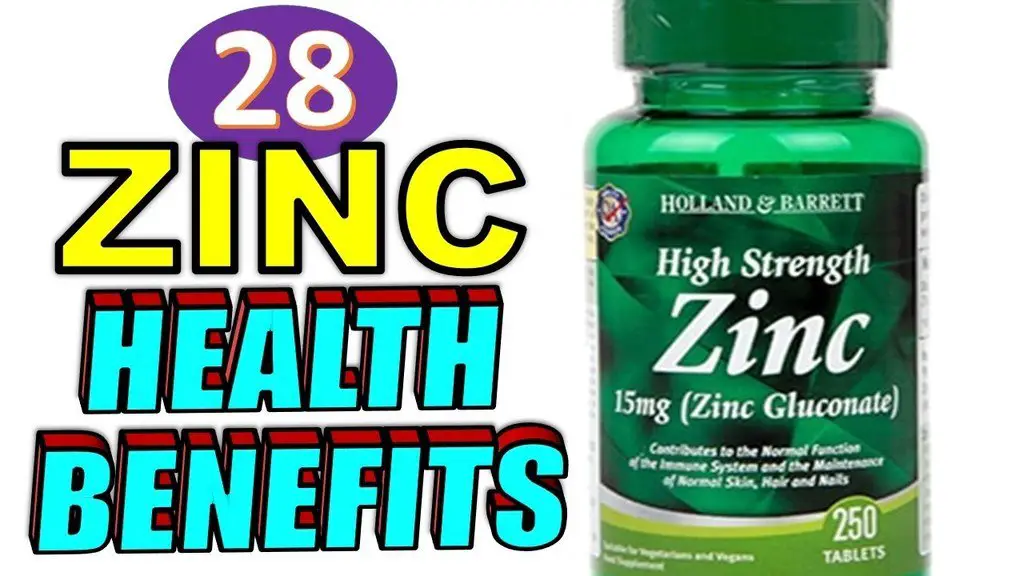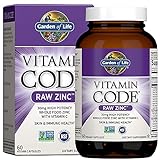Zinc is an essential mineral found in all organs, tissues, and fluids in the body. You can find it in dietary sources like red meat, seafood, nuts, dairy, legumes, and whole grains. Some people may choose to supplement with zinc if they don’t get enough of it in their diet.
Zinc has so many health benefits that it’s almost impossible to cover them all in one video! This mineral has antioxidant and anti-inflammatory effects; it’s essential for immunity, reproduction, mental health, skin health, cognitive function, and so much more. Stay tuned to learn the amazing benefits of zinc.
1. Treating diarrhea

Many studies have shown that in children in developing countries, supplementing with zinc reduced the duration, severity, and incidence of diarrhea. This suggests that having enough zinc in your blood may be useful in helping to reduce diarrhea symptoms.
2. Treats Wilson disease
Zinc supplementation is effective in treating Wilson’s disease, a disorder that causes copper to build up in the tissues. It blocks copper absorption, while also increasing the rejection of copper from the body.
3. May prevent heart disease

Studies have shown that zinc levels are often low in people with heart disease, chest pain, and heart failure. One study found that a higher rate of heart failure was associated with zinc deficiency.
4. Reduces insulin production
Zinc ions can bind to insulin receptors and mimic insulin, which reduces excessive insulin production by cells in the pancreas. This helps protect the pancreatic tissue from damage, especially in patients with diabetes.
Because of zinc’s essential role in the processing, storage, and secretion of insulin, a deficiency can lead to increased insulin resistance. On the other hand, one review of a group of clinical trials found that there were clear benefits of zinc supplementation for blood sugar control and insulin function.
5. Improves skin health

Zinc, both oral and topical, can benefit a variety of skin conditions, including acne, warts, rosacea, eczema, psoriasis, and dandruff. In people with acne, studies showed that those who supplemented with zinc showed a significant improvement in symptoms when compared with those who took a placebo. In another clinical trial, zinc was also found to completely clear warts for the majority of patients.
Zinc supplementation is equally effective at treating other inflammatory skin disorders, like psoriasis and eczema, thanks to its anti-inflammatory and antioxidant properties. Zinc also protects against sun damage to the skin, which can cause skin aging and cancer.
6. Treats depression
A number of studies have associated low blood levels of zinc with more severe symptoms of depression. Zinc supplementation has been found to support standard treatment with antidepressants, as well as reducing anger and other common symptoms of depression.
7. Boosts the immune system

Zinc is essential for the normal development and function of many of our immune cells. Because of the critical role it plays in the immune system, even a mild deficiency in zinc can negatively affect immune function and increase the risk of bacterial and viral infections. If you’re falling ill more frequently than usual, you may not have enough zinc in your blood.
Studies in HIV patients with low blood zinc levels show that daily supplementation of zinc is associated with a reduced risk of infection and failure of the immune system – although too much zinc can actually have the opposite effect, so getting the right dose is important.
8. Fights the common cold
Struggling to deal with a common cold? Thanks to its immune-boosting properties, zinc is one of the most popular supplements for treating this mild viral condition. Zinc has been found to decrease the duration of cold symptoms, like a runny nose, a temperature, and a sore throat, helping you to get back to your best self sooner.
9. Helps maintain good eyesight
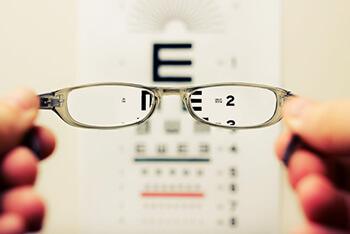
Macular degeneration, a major eyesight problem in the elderly, can be slowed down by zinc supplementation. This is because zinc prevents oxidative damage to the retina. It’s thought that zinc is most effective in treating eyesight when used with other antioxidants such as vitamin C and vitamin E.
A study found that zinc is also able to enhance the effect of vitamin A, which can help to reduce night blindness, another fairly common eye disorder.
10. Improves the performance of the brain
Zinc supplementation can be used to improve cognitive recovery in people who have suffered a stroke. It can also improve cognitive performance, particularly attention and reasoning skills, in children.
11. Improves symptoms of asthma

Getting enough zinc has been found in studies to reduce symptoms of asthma, such as a cough, wheezing, and shortness of breath. Equally, low blood zinc levels have been linked to more severe asthma symptoms in children in particular.
Zinc is effective in reducing airway inflammation and over-sensitivity in people who are experiencing allergic inflammation or asthma.
12. Speeds up wound healing
Being deficient in zinc is associated with delayed wound healing while applying zinc topically has been found to enhance the repair of skin issues like ulcers, as well as speed up the healing process after surgery or burns.
13. Improves bone health
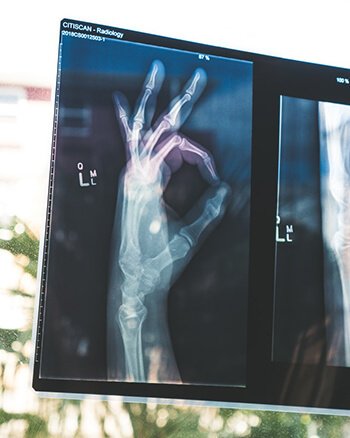
Zinc supplementation has been found to improve bone density in people with certain bone disorders. It can also increase the production of the genes needed for bone formation and even prevent bone loss.
14. Improves pregnancy outcomes
Low blood zinc levels are associated with pregnancy complications, such as spontaneous abortion, pre-eclampsia, extended pregnancy, preterm birth, and abnormal foetal development. On the other hand, zinc supplementation can reduce the risk of preterm birth and assist in the proper development of the foetus.
Zinc may even be effective in increasing infant birth weights and head circumferences. This is most likely a result of its ability to prevent embryonic cell death, increase growth factors, and reduce oxidative damage.
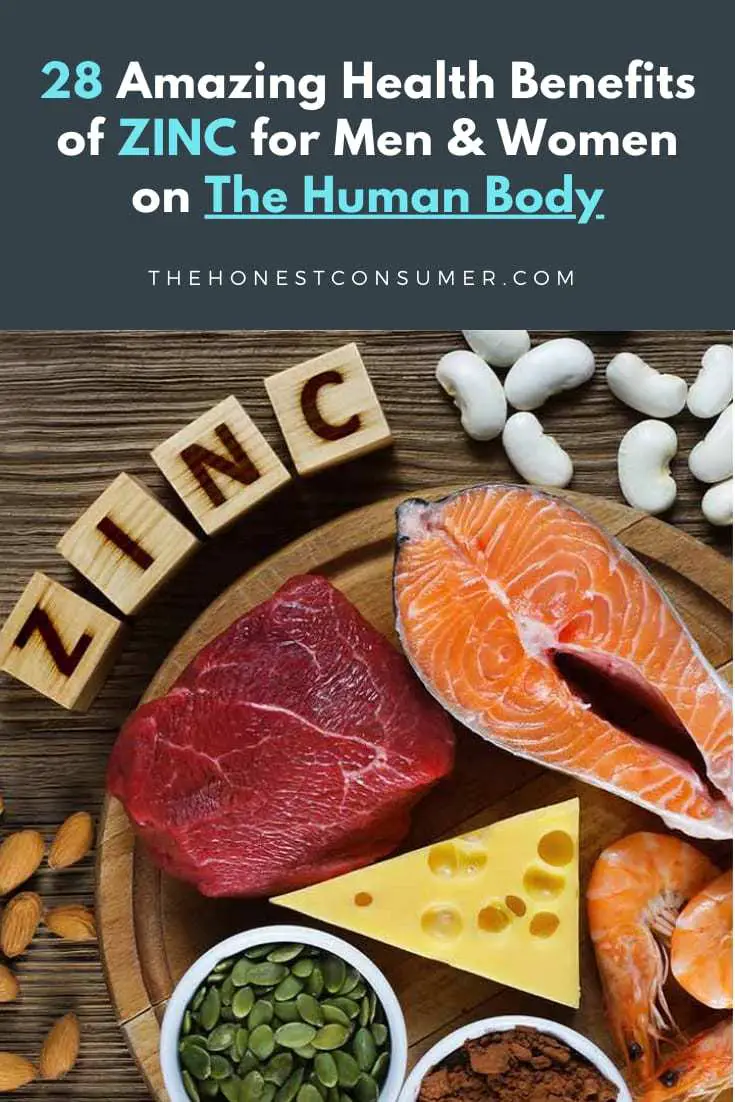
15. Reduces menstrual pain

Zinc deficiency is associated with hormonal imbalances that can lead to menstrual pain and even infertility. A number of studies have found that zinc can help reduce the severity and duration of menstrual pain, and can even slow the progression of endometriosis, a disorder that causes the tissue inside the uterus to grow outside.
16. May improve hearing disorders
People with tinnitus, which causes ringing in the ears, generally have lower levels of zinc in their blood. Supplementing with zinc has been found to reduce the symptoms of tinnitus, as well as other hearing loss disorders, including middle ear infections and sudden hearing loss.
17. Promotes oral health
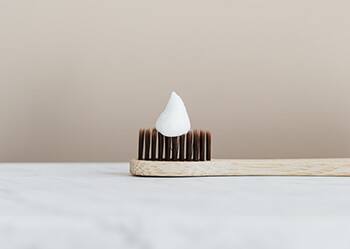
Zinc deficiency can lead to plaque formation and worsen inflammation in gum disease. You might have seen that zinc is an ingredient in some mouthwashes, and that’s because swilling with zinc is effective in reducing plaque growth.
You can also buy toothpaste that contains zinc, which can help treat gum disease.
18. Reduces body odour
Sweating and body odour is usually associated with increased bacteria in certain parts of the body, like the feet and the armpit region. Because of its antibacterial action, topical zinc has proven to be effective in reducing armpit and foot odour in clinical studies.

19. May prevent the progression of Alzheimer’s disease
Several studies have found that zinc supplementation can protect against cognitive decline in Alzheimer’s patients by lowering blood copper levels and improving zinc nutritional status. Zinc has also been found to preserve learning and memory function, as well as reduce factors associated with the progression of the disease.
20. Improves male fertility
Making sure to get enough zinc every day can help you to be more fertile, according to research. High levels of zinc are associated with sperm count, and the motility and sustainability of sperm, in different clinical trials.
This is likely because zinc can stabilize sperm cell membranes and DNA, encouraging the new formation of sperm.
21. Treats fatigue

One study found that blood zinc levels were significantly lower in people who had chronic fatigue syndrome and that higher intakes of zinc could provide antioxidant and anti-inflammatory properties to prevent fatigue.
22. Assists in healthy digestion
The next time you struggle with digestive issues, consider whether you’re getting enough zinc. Zinc deficiency has damaging effects on the gut lining and can worsen digestive issues like inflammatory bowel disease, diarrhea, cancer, alcohol toxicity, and colitis.
In most cases, zinc supplementation has been found to provide improvement of symptoms of these disorders.
23. Prevents seizures
People with epilepsy tend to have lower levels of zinc in their blood, and zinc therapy was found to significantly reduce the frequency of seizures in a number of patients. While we still need to research more thoroughly into the idea that zinc can be used to prevent seizures, the results so far look promising.
24. Decreases the severity of chemotherapy side effects

Oral mucositis, which causes painful ulcers in the mouth, is a common side effect of chemotherapy and radiotherapy. Studies have found that cancer patients who underwent chemotherapy and radiotherapy were able to reduce the severity of their oral mucositis when supplementing with zinc.
Zinc may also be useful in helping patients to maintain a sense of taste and smell during chemotherapy.
25. May reduce the severity of autism symptoms
Supplementing with zinc may help to reduce the severity of autism symptoms, such as hyperactivity, poor focus, and attention, lack of eye contact, heightened sensitivity to sound, and seizures. A study found that children with autism had high copper levels, which were reduced when they supplemented with zinc.
26. Improves sleep quality

Struggling to get to sleep at night? It might be that you’re missing out on zinc. Studies have found that adults and children with higher blood zinc concentrations have better sleep quality, and zinc has even been found to prolong sleep duration.
27. Improves physical performance
When you do heavy exercises, such as jogging or a gym workout, you may experience a reduction in your thyroid hormones and testosterone levels, which can lead to exhaustion. Zinc supplementation is thought to be able to prevent this loss, helping you to perform at your best throughout your entire workout.
28. Reduces hair loss

If you’re dealing with hair loss, don’t be so fast to seek out an expensive solution. Research has found that applying topical zinc to areas of baldness can improve hair growth.
It’s thanks to zinc’s antimicrobial, anti-inflammatory, and antioxidant effects that it can increase hair density on the scalp. Zinc can also reduce the symptoms of alopecia, and reverse hair loss in people who have previously been deficient in the mineral.
Conclusion
There are so many health benefits to zinc, and, more importantly, so many reasons why it’s essential that you get the right amount of zinc in your diet. If you think you might be zinc deficient, book an appointment with your doctor, who can test you for deficiency.
While there are plenty of ways to include zinc in your diet, you might want to consider supplementing, especially if you’re a vegetarian, as most dietary zinc comes from meat products. See below for the best supplements.
- Immune health and antioxidant support supplement: contains one 100 count bottle of Nature Made Zinc 30 mg Tablets for a 100-day supply
- Immune support mineral: This Zinc 30 mg supplement supports the body's natural immune defense system
- An antioxidant: Zinc supports the vital functions of over 100 different enzymes in the body which is important for overall health
- Key skin health nutrient: Zinc helps support healthy skin
- Immune Support Supplement: Zinc supports the body's natural defense system; aids immune system function, wound healing, and the absorption of B vitamins*
- Metabolism Support: Zinc supports the digestion and metabolism of important vitamins, minerals, carbohydrates, and other essential nutrients*
- Zinc Picolinate Supplements: These zinc capsules support normal fetal and reproductive development*
- Highly Absorbable Zinc Capsules: These 30 mg zinc capsules are easily absorbable, and support absorption and actions of essential B vitamins*
- ZINC WITH VITAMIN C FOR IMMUNE HEALTH: Our Zinc supplement provides whole food nutrition with 30mg of elemental Zinc (over 250% of the new daily value) plus 60mg of raw vitamin C, both in a whole food form for optimal nutrient absorption and utilization
- NATURAL COFACTORS: Raw Organic fruits & vegetables, alkalizing trace minerals and probiotics & enzymes add additional antioxidants, vitamins and cofactors to our Vitamin Code Vegan Zinc formula, enabling the natural recognition of nutrients by your body
- WHY RAW ZINC: Raw means these Zinc pills are made without high heat, and they contain no synthetic or filler ingredients - Just Raw, food created nutrients for immune system support, skin health and eye health, as well as prostate health
- ZINC FOR SKIN HEALTH PLUS PROBIOTICS & ENZYMES: Our plant based chelated Zinc vitamin includes a Raw Probiotic and Enzyme blend for added digestive support; You can also open the capsules and mix the contents with water or juice, if you wish

